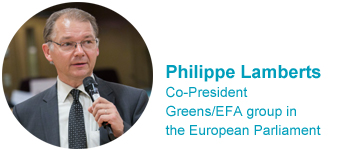Politics for the next generation
Wednesday, Mar 20, 2019
When I meet with the young climate demonstrators, I am struck by their sense of urgency : this is about preserving the chances of survival of humankind on this planet. I am also impressed by the fact their political maturity. And, despite their name, they show that they worry about the entire environmental equation : not just climate, but also biodiversity and resource exhaustion.
This is the context in which the Forum for the Future of Agriculture will be taking place, in the city that has seen the most intense flow of demonstrators since Dec. 2, 2018.
Food and agriculture are a major component of human life on Earth and of our impact on nature. If we want our societies to live and flourish, they need to fit back into the safe and just operating space that is set to us by nature, as described by economist Kate Raworth (“The Doughnut Economy”), our agricultural model has to change drastically. In that area, the European Union institutions have a key role to play, using the powerful lever of the Common Agricultural Policy. The CAP remains the largest component of the EU budget and one could think that we are on a good path, since the intention of allocating 20% of the expenditures to activities linked to the fight against climate change seems to be widely accepted.
I would argue that this approach fails to recognize the gravity and the urgency of the challenge we need to face. What does it mean to apportion 20% of our expenditures, if the other 80% are actually funding activities that fuel climate change. This would equate to spend 80% of your resources spoiling the planet then the remaining 20% to help curbing the damage that you keep inflicting. Rather than such a climate-apportionment strategy, we advocate an ecological mainstreaming approach, by which not a single Euro of the EU budget should go to activities that aggravate our ecological impact, not limited to climate change.
That would require a fundamental shift in the CAP, away from the agro-business, intensive, global-market oriented model towards and extensive, locally-driven one, where the financial support would primarily to smaller-scale farms whose activities deliver improvements of the ecosystem services and a reduction of our ecological footprint. Needless to say, such a drastic reorientation would run counter major vested interests, as the CAP debates regularly demonstrate. But then again, it is the preservation of those vested interests – driven by the race to highly-concentrated short-term financial profits – that is precisely the root cause of climate change.
Are we going to witness a shift of political majorities in Europe, making such a reorientation possible? That is probably the most crucial question that the European citizens will answer next May.


